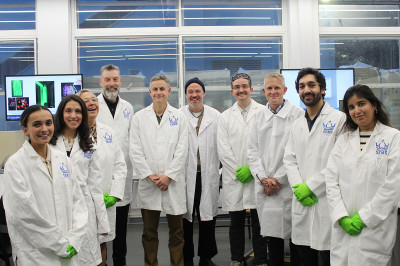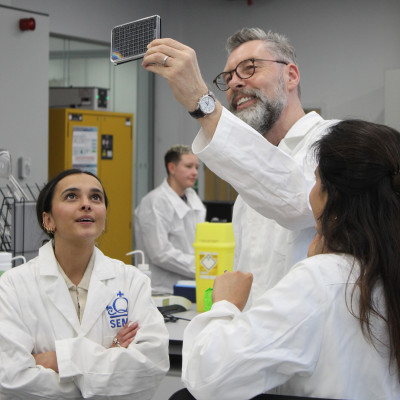News
Will Young Visits Queen Mary to Explore Alternatives to Animal Testing
16 November 2025


A group of high-profile guests visited Queen Mary's Centre for Predictive In Vitro Models on Tuesday 11 November, to explore the university’s cutting-edge organ-on-a-chip facilities.
The delegation included musician and animal advocate Will Young, a Director and Toxicologist from Lush cosmetics, and representatives from the charity Animal Aid. The group took part in presentations and workshops showcasing how organ-on-a-chip technology has the potential to revolutionise personalised medicine, speed up drug discovery, and significantly reduce the need for animals in scientific research.
Professor Martin Knight led hands-on demonstrations of the technology in action, assisted by post-doctoral researchers, who showed the group Emulate silicone chips and CN Bio chips, which allow researchers to link organs together.
The visitors enjoyed pipetting cell substances into the chips and learning about how the different models work to mimic the environment of the human body.
Organ-on-a-chip innovations have the potential to revolutionise treatments for cancers, heart, liver and kidney diseases, and much more. The visit took place on the day the Government announced a new strategy to reduce the use of animals in science, which names organ-on-a-chip technology as one of three priority areas for future investment. Professor Knight and Professor Screen consulted on the development of the strategy, through their roles as members of the Government’s Animals in Science Committee.
“Given that the Government announced their strategy for phasing out animal testing today, it was an amazing time to be here to see new models being developed and the future of non-animal labs,” said Karl Bygrave, Co-Director at Lush, speaking at the visit.
“This technology is very exciting for Lush, what we’re seeing is the future. As a cosmetics manufacturer, this technology will filter down to us and in a number of years, we will be using this for our own purposes, to check the safety of our products.”
Will Young said “I feel very excited about the future. The aim is to have better science, better medicine and no abuse to animals – and today has shown me that that’s possible.”
Queen Mary has recently launched the world’s first taught master’s degree in organ-on-a-chip technology, along with a Centre for Postdoctoral Training that will equip the next generation of specialists in the field.
The university's organ-on-a-chip research is carried out in close collaboration with more than 150 partners across the pharmaceutical, biotechnology, medical device, and regulatory sectors, ensuring that the technologies developed directly address industry needs.
| Contact: | Aine McCarthy |
| Email: | aine.mccarthy@qmul.ac.uk |
| People: | Martin KNIGHT Hazel SCREEN |
| Research Centre: | Bioengineering |

